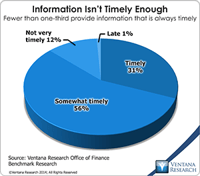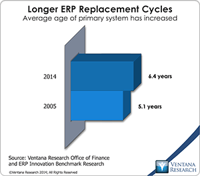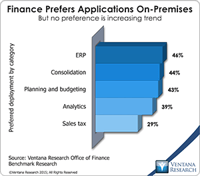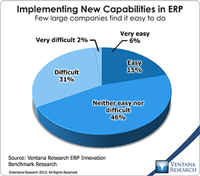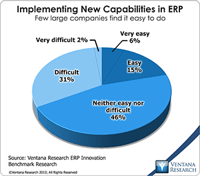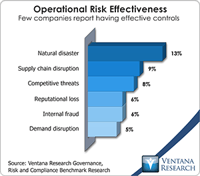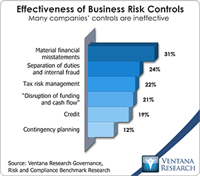There were two noteworthy themes in SAP CEO Bill McDermott’s keynote at this year’s Sapphire conference. One was customer assurance; that is, placing greater emphasis on making the implementation of even complex business software more predictable and less of an effort. This theme reflects the maturing of the enterprise applications business as it transitions from producing highly customized software to providing configurable, off-the-rack purchases. Implementing ERP will never be simple, as I...
Read More
Topics:
Predictive Analytics,
SAP,
Operational Performance Management (OPM),
Uncategorized,
Business Performance Management (BPM),
Customer Performance Management (CPM),
Financial Performance Management (FPM),
Sales Performance Management (SPM),
Supply Chain Performance Management (SCPM)
Workday Financial Management (which belongs in the broader ERP software category) appears to be gaining traction in the market, having matured sufficiently to be attractive to a large audience of buyers. It was built from the ground up as a cloud application. While that gives it the advantage of a fresh approach to structuring its data and process models for the cloud, the product has had to catch up to its rivals in functionality. The company’s ERP offering has matured considerably over the...
Read More
Topics:
Microsoft,
SAP,
ERP,
FP&A,
NetSuite,
Office of Finance,
Operational Performance Management (OPM),
Reporting,
close,
closing,
Controller,
dashboard,
Human Capital,
Reconciliation,
Tax,
Analytics,
Business Intelligence,
Cloud Computing,
Collaboration,
IBM,
Oracle,
Uncategorized,
Business Performance Management (BPM),
CFO,
Data,
finance,
Financial Performance Management (FPM),
Financial Performance Management,
FPM,
Intacct
The enterprise resource planning (ERP) system is a pillar of nearly every company’s record-keeping and management of business processes. It is essential to the smooth functioning of the accounting and finance functions. In manufacturing and distribution, ERP also can help plan and manage inventory and logistics. Some companies use it to handle human resources functions such as tracking employees, payroll and related costs. Yet despite their ubiquity, ERP systems have evolved little since their...
Read More
Topics:
Big Data,
Microsoft,
SAP,
Social Media,
ERP,
FP&A,
Mobile Technology,
NetSuite,
Office of Finance,
Operational Performance Management (OPM),
Reporting,
close,
closing,
Controller,
dashboard,
Human Capital,
Reconciliation,
Analytics,
Business Intelligence,
Cloud Computing,
Collaboration,
IBM,
Oracle,
Uncategorized,
Business Performance Management (BPM),
CFO,
Data,
finance,
Financial Performance Management (FPM),
Supply Chain Performance Management (SCPM),
Financial Performance Management,
FPM,
Intacct
Whatever Oracle’s cloud strategy had been the past, this year’s OpenWorld conference and trade show made it clear that the company is now all in. In his keynote address, co-CEO Mark Hurd presented predictions for the world of information technology in 2025, when the cloud will be central to companies’ IT environments. While his forecast that two (unnamed) companies will account for 80 percent of the cloud software market 10 years from now is highly improbable, it’s likely that there will be...
Read More
Topics:
Microsoft,
Predictive Analytics,
SAP,
ERP,
FP&A,
Mobile Technology,
NetSuite,
Office of Finance,
Operational Performance Management (OPM),
Reporting,
close,
closing,
Controller,
dashboard,
Human Capital,
Tax,
Analytics,
Business Collaboration,
Business Intelligence,
Cloud Computing,
Collaboration,
IBM,
Oracle,
Business Performance Management (BPM),
CFO,
Customer Performance Management (CPM),
Data,
finance,
Financial Performance Management (FPM),
Sales Performance Management (SPM),
Supply Chain Performance Management (SCPM),
Financial Performance Management,
FPM,
Intacct,
Spreadsheets
In the wake of the past year’s usual crop of failed ERP implementations, I’ve read a couple of blogs that bemoan the fact that ERP systems are not nearly as user-friendly or intuitive as the mobile apps that everyone loves. I’ve complained about this aspect of ERP, and our research confirms that ERP systems are viewed as cumbersome: Just one in five companies (21%) said it is easy to make changes to ERP systems while one-third (33%) said making changes is difficult or very difficult. Yet as...
Read More
Topics:
Mobile,
SAP,
ERP,
Analytics,
Business Collaboration,
Cloud Computing,
Oracle,
Business Performance Management (BPM),
CFO,
Financial Performance Management (FPM),
Infor,
Workday,
Social,
business process,
FPM,
Intacct
Enterprise resource planning (ERP) systems emerged in the 1990s. Even though they don’t do much in the way of planning, the systems provide companies a means of centralizing and consolidating transaction data collection (such as purchase orders, inventory movements and depreciation), automating the management of processes, and handling the bookkeeping and financial record keeping for these transactions and related processes. ERP systems are an indispensable piece of IT infrastructure in today’s...
Read More
Topics:
Mobile,
SAP,
Social Media,
ERP,
Operational Performance Management (OPM),
Analytics,
Business Collaboration,
Cloud Computing,
Oracle,
Business Performance Management (BPM),
CFO,
Infor,
Supply Chain Performance Management (SCPM),
Workday,
Social,
FPM,
Intacct
In some parts of the world, bribing government officials is still considered a normal cost of doing business. Elsewhere there has been a growing trend over the past 40 years to make it illegal for a corporation to pay bribes. In the United States, Congress passed the Foreign Corrupt Practices Act (FCPA) in 1977 in the wake of a succession of revelations of companies paying off government officials to secure arms deals or favorable tax treatment. More recently other governments have implemented...
Read More
Topics:
SAP,
ERP,
Governance,
GRC,
Operational Performance Management (OPM),
bribery,
Business Analytics,
Governance, Risk & Compliance (GRC),
IBM,
Operational Intelligence,
Oracle,
Business Performance Management (BPM),
CFO,
compliance,
Financial Performance Management (FPM),
FPM,
Oversight Systems
SAP recently announced its new Fraud Management analytic applications. Currently in “controlled” (limited) release, it’s a promising start for the product and a good example of the type of business process revolution that’s possible when companies can execute complex analytics on big data sets using in-memory and other advanced processing techniques. Over the next several years a wide swath of basic corporate processes will be transformed by the shift to in-memory processing and big data...
Read More
Topics:
SAP,
Fraud,
Governance,
GRC,
Office of Finance,
audit,
Analytics,
Business Analytics,
Governance, Risk & Compliance (GRC),
Business Performance Management (BPM),
compliance,
Financial Performance Management (FPM),
Risk,
HANA
Read More
Topics:
Mobile,
Predictive Analytics,
Real-time,
SAP,
ERP,
Operational Performance Management (OPM),
Analytics,
Business Analytics,
Business Collaboration,
Cloud Computing,
In-memory,
Business Performance Management (BPM),
CRM,
Customer Performance Management (CPM),
finance,
Financial Performance Management (FPM),
Sales Performance Management (SPM),
Supply Chain Performance Management (SCPM),
Workforce Performance Management (WPM),
Social,
Business Suite,
Financial Performance Management,
HANA
SAP has inaugurated a new series of business applications it calls Enterprise Performance Management (EPM) OnDemand as a cloud-based subscription service. The applications are part of SAP’s EPM version 10 suite, which it introduced last year. It’s a first step in what is likely to be a portfolio of general-purpose, lightweight and relatively low-cost apps designed to be used on mobile devices. Using HANA on the back end, the applications can deliver high performance in accessing masses of...
Read More
Topics:
Big Data,
Performance Management,
SAP,
Office of Finance,
Operational Performance Management (OPM),
expense,
Analytics,
Business Analytics,
Business Collaboration,
Cloud Computing,
Business Applications,
Business Performance Management (BPM),
Customer Performance Management (CPM),
Financial Performance Management (FPM),
Sales Performance Management (SPM),
Supply Chain Performance Management (SCPM),
Workforce Performance Management (WPM),
FPM,
HANA
